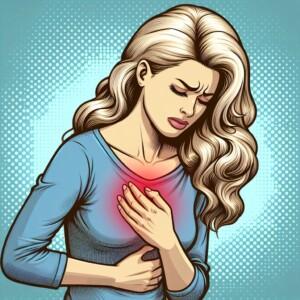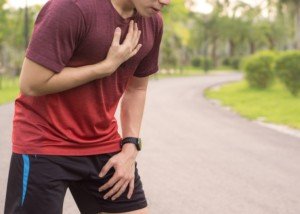
You already know that PVCs can be caused by anxiety, but just HOW does this mechanism occur?
“PVCs, which are extra beats that occur commonly and if they occur in modest frequency are not necessarily a pathologic condition,” begins cardiologist and internal medicine specialist Norman E. Lepor, MD, who’s with Cedars Sinai in Beverly Hills, CA.
“The sensation of the PVC is usually referred to as a palpitation or extra beats.
“The sensing of extra bests seems to occur both with anxiety related to both excess adrenaline release, leading to cardiac electrical excitation, and to heightened sensitivity to one’s heartbeat that occurs in an anxiety state.”
The “stress hormone” adrenaline, then, is a culprit when a person experiences a premature ventricular contraction during a stressful or fear-inducing event.
In fact, if you tend to feel the thump-THUMP of PVCs when you experience acute anxiety or some kind of fear, you’ll also notice that you have that “butterflies in the stomach” feeling — and this is the adrenaline at work:
The body’s so-called fight or flee hormone that revs up the body’s engine to prepare it for a fight or escape.
“People also have a tendency to feel these extra beats at bedtime when the environment is quiet and there are fewer distractions,” says Dr. Lepor.
Beware of the Bed

Bedtime — right after you slip into bed and are just lying there, awake and thinking — is also the time that many people begin reflecting about all the problems going on in their lives, and all the tasks they must get through come next day — and this leads to anxiety and…of course…the PVCs.
For some people, the bed is a conditioned stimulus to anxiety and edginess, as they anticipate the stresses that the next day will bring on.
These stressors include the next day being Monday, a doctor or dentist appointment, a visit from a relative, a situation with a neighbor and a new injury.
Dr. Lepor continues, “Cortisol is not directly related to PVCs, but as a stress hormone it is released in higher concentrations along with adrenaline.
“It is the adrenaline component that is more responsible for the cardiac effects of stress and the cortisol which tries to mitigate this effect.”
Engaging in strenuous exercise can help blunt cortisol production.
While moderate exercise can elevate cortisol levels temporarily, intense physical activity such as HIIT can lead to a more balanced hormonal response over time.
This effect can help you manage anxiety and also reduce the occurrences of premature ventricular contractions.

Having performed over 4,000 coronary angiograms and angioplasties, Dr. Lepor has focused on prevention and treatment of coronary heart disease.
 Lorra Garrick has been covering medical, fitness and cybersecurity topics for many years, having written thousands of articles for print magazines and websites, including as a ghostwriter. She’s also a former ACE-certified personal trainer.
Lorra Garrick has been covering medical, fitness and cybersecurity topics for many years, having written thousands of articles for print magazines and websites, including as a ghostwriter. She’s also a former ACE-certified personal trainer.
.
Top image: ©Lorra Garrick









































